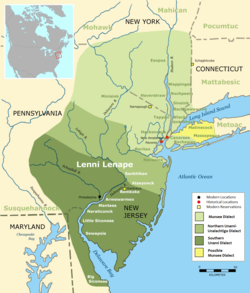Lenape Nation

Lenapehoking, the original Lenape territory. Munsee speakers in the north, Unami-speakers in the center, and Unalichtigo-speakers in the south. West/left side geographic limits correspond closely to ridgelines (drainage divides) between the Susquehanna and Delaware river valleys.
|
|
| Total population | |
|---|---|
| Estimated 16,000 | |
| Regions with significant populations | |
|
|
11,195 (2010) |
|
|
1,565 |
| Languages | |
| English, Munsee, and Unami | |
| Religion | |
|
Christianity, Native American Church, traditional tribal religion |
|
| Related ethnic groups | |
| Other Algonquian peoples | |
The Leni Lenape,Lenape (/ləˈnɑːpɛ/), or the Delaware people, are an indigenous people of the Northeastern Woodlands, who live in Canada and the United States. They are also called Delaware Indians and their historical territory included present-day New Jersey and eastern Pennsylvania along the Delaware River watershed, New York City, western Long Island, and the Lower Hudson Valley.
During the Beaver Wars in the first half of the 17th century, European colonists were careful to keep firearms from the coastally located Delaware, while rival Iroquoian peoples such as the Susquehannocks and Confederation of the Iroquois became comparatively well armed. Subsequently, the Lenape became subjugated and made tributary to first the Susquehannocks, then the Iroquois, even needing their rivals (superiors) agreement to initiate treaties such as land sales. Like most tribes, Lenape communities were weakened by newly introduced diseases originating in Europe, mainly smallpox but also cholera, influenza and dysentery, and recurrent violent racial conflict with Europeans. Iroquoian peoples occasionally fought the Lenape. As the 18th century progressed, many surviving Lenape moved west —into the (relatively empty) upper Ohio River basin.
...
Wikipedia
